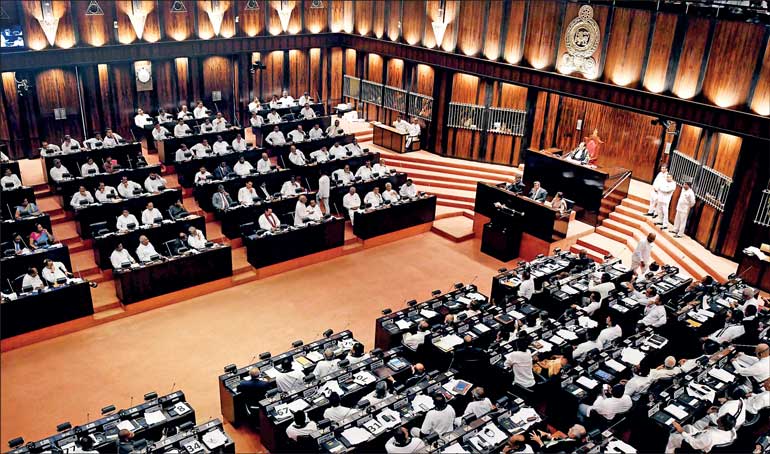Monday Feb 16, 2026
Monday Feb 16, 2026
Monday, 2 January 2023 00:00 - - {{hitsCtrl.values.hits}}

The NEP will join the piles of irrelevant policy documents because its drafters gave primacy to majority dominance over common sense on how best to protect the environment. But sadly, this is unlikely to be the only sub-optimal policy choice we make

If 2022 showed us anything, it was that our political class is unable to put the country ahead of party and work together. This is unfortunate, given the massive challenges ahead. This crisis is far from over.
The poor suffered the most in 2022, inflation and shortages compounding the effects of the pandemic and lockdowns. The effects will be felt this year by those who flourished in the patronage-centric economy that brought us to this sorry pass. They will try their utmost to safeguard their privileges and the country may become difficult to govern. Elections will be held, most likely the Presidential Election in November 2023. As Lebanon has shown, elections do not necessarily make governance easier.
Inflation is coming down, but the economy’s contraction will not stop unless all the elements of the debt restructuring are completed. Unless necessary reforms are completed, Sri Lanka will not get back on a growth path. Unless these things are done, we will truly earn the label of a failed state.
Failed/fragile states
When our Government drove the economy off a cliff, two analyses I had published in LBO in 2006 and 2007 on the Failed States Index came to mind. The Fund for Peace, a Washington DC based organisation, has been publishing these, now renamed the Fragile States Index (FSI), annually since 2005. It is based on a proprietary software called CAST [Conflict Assessment System Tool] using thousands of news reports from open sources as data. For many years researchers have been developing tools such as CAST to predict the political equivalents of natural disasters and assist in risk management. Perhaps, they had picked up early signs of our calamity, I surmised.
The ranking Sri Lanka received in 2007 (25th, lower being bad), worse that Rwanda (36th) and Liberia (27th), did not seem right. However dispassionate one tries to be, it is difficult to accept one’s country being labelled a failed state. Perhaps that was why I did not return to the index after 2007.
The overall score of a country is based on 12 indicators, grouped into four categories: cohesion, economic, political and social. Cohesion includes Security Apparatus, Factionalised Elites, and Group Grievance. Economic is made up of Economic Decline, Uneven Economic Development, and Human Flight & Brain Drain. The political category includes State Legitimacy, Public Services, and Human Rights & Rule of Law. Social is comprised of Demographic Pressures, Refugees & IDPs, and External Intervention.
Whatever the FSI picked up in 2007, it no longer did in 2022. Sri Lanka was now ranked 56th, no longer below Rwanda (now in 41st place) and Liberia (33rd). It is now grouped with relatively stable countries such as India and Brazil, and no longer with Ethiopia and Rwanda. It appears that Sri Lanka’s rank jumped from 34th in 2015 to 43rd in 2016, and generally maintained an upward trajectory since then.
While the overall score failed to predict the catastrophe resulting from the return of the Rajapaksas, it did catch one serious problem. Our high score on factionalised elites, which was 8.9/10 in 2006 is now higher at 9.1. On the group grievance indicator, Sri Lanka was 9.1/10 in 2006. It has decreased to 8.1 in 2022, after having almost hit the maximum at 9.8/10 in 2009-2010. If these two numbers are brought down, Sri Lanka is likely to perform even better than India, which has been on a downward trajectory since 2014. India is now ranked 69th, down from 109th place in 2007.
Factionalised elites
According to the FSI website, the “Factionalized Elites indicator considers the fragmentation of state institutions along ethnic, class, clan, racial or religious lines, as well as and brinksmanship and gridlock between ruling elites. It also factors the use of nationalistic political rhetoric by ruling elites, often in terms of nationalism, xenophobia, communal irredentism (e.g., a “greater Serbia”) or of communal solidarity (e.g., “ethnic cleansing” or “defending the faith”). In extreme cases, it can be representative of the absence of legitimate leadership widely accepted as representing the entire citizenry. The Factionalized Elites indicator measures power struggles, political competition, political transitions, and where elections occur will factor in the credibility of electoral processes (or in their absence, the perceived legitimacy of the ruling class).”
It is no surprise that Sri Lanka scores high (poorly) on this indicator. The puzzle is why the authors concluded that things had improved since 2009.
Not just the politicians
The problem is not limited to the political leadership; the upper stratum of the bureaucracy and the attendant experts are equally, if not more, culpable. I can write a book on this, but one illustration should suffice.
The National Environment Policy (NEP) was approved by Cabinet on 20 June 2022. The members of Cabinet would have had many other things on their mind at that time, including Basil Rajapaksa’s resignation on 9 June and their personal safety, but it is recorded that they approved this 90-page document amidst the turmoil. The Minister was appointed on 23 May, just days before the policy would have been submitted to Cabinet. Therefore, assigning praise or blame to the officials and experts who drafted the document would not be unfair.
The NEP includes one platitudinous reference to the Constitution on p. 8. The drafters disregarded the explicit inclusion of the protection of the environment in the Provincial Council List (Ninth Schedule of the Constitution). The Implementation Mechanism given as Figure 1 makes no mention of Provincial Councils at all; the ungainly steering committee chaired by the Secretary of the Ministry of Environment has representation from every conceivable central Ministry and none from the provinces. What is sad and surprising is that the Cabinet Paper on this unconstitutional policy would have been signed by the former Chief Minister of the Eastern Province.
To be fair, para 4.7.1.1 does state that “appropriate mechanisms will be set up to ensure the coordination among multiple government agencies involved in environmental management, vertically (between national and subnational level agencies) and horizontally (among national or subnational agencies) whenever necessary according to the needs of actions/programmes in operation.” But this is not operationalised in the policy.
The very last paragraph of the report recognises in passing the role of sub-national agencies such as Local Government Authorities and Provincial Councils. The exclusion of these agencies in the Implementation Mechanism justifies this being described as not integral to the NEP.
There are a total of five mentions of Provincial Councils and a few more of local government bodies, mostly in relation to solid waste and hazardous waste. The drafters appear ignorant of the existence of Provincial Departments of Irrigation (in the case of the Northern Province with authority over all the rivers that flow through it) and of the Supreme Court determination re Water Services Reform Bill of 2003 (SC (SD) 24/2003 and 25/2003) that drinking water falls within Provincial Council jurisdiction. By extension, sewerage and septage are also provincial subjects. According to the Constitution, all land and all waterways and reservoirs, except those connected to rivers that run across more than one Province, fall under Provincial Council jurisdiction.
But all this has been ignored by the drafters of the NEP. This policy is a manifestation of group grievance (8.1/10 according to the 2022 FSI), resulting in factionalisation of elites (9.1/10), and disregard for the rule of law (7.9/10).
The NEP has been drafted by experts and officials ignoring Constitutional provisions and decisions of the Supreme Court. It has been approved by Cabinet despite the above. Various governments since 1987 have refused to implement the Constitutional provisions related to land and police powers. What all this shows is blatant disregard for the rule of law by politicians, bureaucrats and experts.
The underlying cause is group grievance. It is common sense that environmental protection is, with a few exceptions such as oceanic and atmospheric pollution, best implemented by the layers of government that are closest to the ground, namely local government authorities and provincial councils. Yet, the elites have colluded in claiming central-government authority.
Not content with violating common sense, the NEP violates the Constitution. This is because of group grievance: the opposition to yielding authority to any provincial council or local government authority led by politicians not of the majority ethnicity. Because of animosity toward the Northern and Eastern Provincial Councils, even those in the rest of the country are degraded and crippled.
Fragile Sri Lanka
Sri Lanka’s standing in the Fragile States Index will start to decline because of the events of 2022. It will be justified.
We are truly a fragile state, incapable of cohesion. We give too much weight to ethnic domination and adopt sub-optimal solutions driven by group grievance. The NEP will join the piles of irrelevant policy documents because its drafters gave primacy to majority dominance over common sense on how best to protect the environment. But sadly, this is unlikely to be the only sub-optimal policy choice we make.